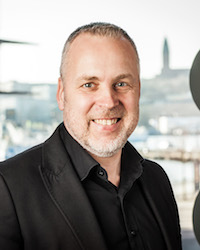Media and Democracy: research and innovation to strengthen journalism, public discourse and democracy
Media organisations, academics and public institutions work together on experimental innovation and research at Lindholmen Science Park.
In the summer of 2017, the Media and Democracy research and innovation programme was launched to facilitate collaboration on experimental projects between universities and media companies in Sweden. Its core mission is to initiate, finance and run research and innovation projects that provide new knowledge and tools for journalism and civil dialog.
Head of the programme Martin Holmberg and his colleague Jonathan Falck bring together different actors and share new insights about the ways in which innovation influences media and democracy through reports and seminars. Built on the ideals of open innovation, citizens are welcome to participate in their activities as well.
While media companies don’t collaborate as much as they could or should, academics are increasingly looking to get access to news organisations for making their research more relevant to practice. According to Martin, Lindholmen Science Park provides a neutral space where they can meet physically and mentally to develop innovative ideas together:
“We are a non-profit company. Our mission is to get benefits to society and get the actors to succeed. No one can be afraid of Lindholmen, because we have the mission just to do nice things for all the people in our network.”
Reinforcing local democracy
Swedish local newspaper Borås Tidning, RISE Interactive and Södertörn University are part of one of the Lab’s first projects. In an attempt to strengthen journalism at the local level, the project runs an experiment with topics and formats interesting for younger audiences:
“The paper has employed four people between 25 and 35 years old that work in the newspaper; some are journalists, some are not. They don’t have to listen to the editors like the other journalists, so we can compare the difference. That’s the way we typically want to work, through experimentation.”

This kind of project is one of the ways in which Lindholmen is addressing the challenge of developing the local society in a new media landscape. Even ten years ago, discussions still happened primarily on local platforms; now they mostly take place on social media. That raises important issues for media and democracy, says Martin:
“How can we make sure that in the future you can develop the public discussion in the local society, in the sense that people share enough important information to be able to have prospective, democratic discussions together? On social media you don’t share the same information, so developing the local society becomes a challenge.”
New media behaviour
As society changes, so do the ways in which people interact with media:
“I can see my wife and I for example live very differently than my parents. I live in a small town north of Gothenberg, we take the commuting train, so we can’t spend time on the same things my parents did.
My parents worked within 10 minutes by bicycle from our home. They picked up the newspaper in the morning and in the evening. I remember my father sometimes came home for lunch and then biked back.
I don’t know any people of my age who do this.”
With every project, the goal is to find out how people act, what is important for them, and possibly to develop some technologies to support that. But technology is not in the middle; the starting point is what people need.
Bottom-up problem finding
In the same way, Media and Democracy decides what topics to tackle by asking its network what their main challenges are. Four times a year, they invite people with different skills and experiences to round tables, including scholars, media companies and citizens:
“We discuss what kinds of challenges they see, what projects would be perfect to find new knowledge about these challenges, what experimental ways there are to develop new knowledge, and who in the room would want to participate in such a project or has ideas about who we should talk to.”
It’s especially remarkable how different actors often have very similar issues on their minds, says Martin. The role of Media and Democracy is to collect this input and turn it into concrete projects:
“After these round tables they return to their normal day work, but we have the time and opportunity to think about how we could do this, what partners we could invite, where we could find funding. So we do a lot of work in the background to get these projects up and running.”
Basic funding for the projects comes from the Region Västra Götaland, but the initiative is also supported by commercial media, public broadcasting companies and key media players in the Swedish academic community.
An innovative environment
The Lindholmen Science Park emerged only recently in the old harbor of Gothenberg. When the ship building companies closed their doors in the 1970s, the Science Park successively took their place and attracted companies in the IT, auto mobility and media sectors. Science Parks in Sweden are generally aimed at businesses, but Lindholmen is connecting technology and creativity. They aim to bring together different perspectives and different skills to find new solutions:
“The game incubator launches games that are being downloaded and generate business. Half of all films in Sweden are in some way connected to the film cluster at Lindholmen Science Park. And several companies and communities use the visualisation technology and environment here, including to strengthen democracy.
There might be possibilities to combine some of the expertise and the technologies present in the cluster for media innovation.”
Although the Media and Democracy programme is still very young, Martin hopes its success will be similar to that of the ‘older’ labs at Lindholmen Science Park.
CONTACT POINT

Martin Holmberg, Head of Media & Democracy, Lindholmen Science Park
Web: https://medierochdemokrati.lindholmen.se/en
Twitter: @Lindholmen
